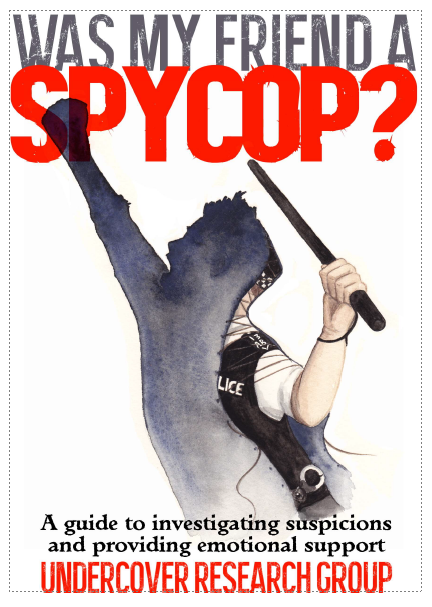The Undercover Research Group (URG) aims to reveal, monitor and analyse political policing in the UK. URG formed in 2013 to document the growing body of knowledge relating to the undercover policing scandal, and is made up of activists and researchers, some of whom had been targeted by spycops.
A research collective, URG’s founding members are Eveline Lubbers and Dónal O'Driscoll, with Chris Brian joining in 2017. Over the years, volunteers and freelancers have helped with the ever-growing amount of work that came in the wake of the Undercover Policing Inquiry.
URG cooperates closely with the women’s support group Police Spies Out of Lives (PSOOL), the Campaign Opposing Police Surveillance (COPS) and the Blacklist Support Group (BSG).
History
The Undercover Research Group was set up after the exposure in 2010 of Mark Kennedy, who infiltrated anarchist and environmental protest groups between 2003-2010 and deceived multiple female activists into relationships. The initial Metropolitan Police response was to use the ‘bad apple’ excuse, a stance it maintained for some time.
At this point there was very little understanding of the true extent of the targeting of political and campaign groups. But as more and more undercovers came to light, a pattern was emerging that needed to be documented. Analysing activists’ accounts of undercover officers’ surveillance, noting the similarities that came up, allowed URG to help those that had been targeted and to support those seeking answers.

For people who had suspicions about members of their groups, we published Was my friend a spycop? – a guide to how to undertake these complicated investigations, the questions to ask and ways for activists to support each other during such difficult processes.
Our investigations led us to identify and publish the names of new undercovers. With the people involved, amongst others we played a role in exposing and documenting amongst others: HN104 Carlo Soracchi ‘Carlo Neri’, HN2 Andrew Coles ‘Andy Davey’, EN35 ‘Ritchie Clark’ and EN37 ‘Gary Rayner.’
We cooperated with Rob Evans at the Guardian on many of the investigations, and with journalists at BBC Newsnight and Channel4 News to get some of the stories out.
Before we launched this website, we published our findings at the Undercover Research portal (Powerbase) and we used to keep a blog at UndercoverResearch.net.

The Spycops Scandal
For over 40 years, the British state secretly placed more than 100 long-term undercover officers into scores of political groups to spy on them and their members, and to subvert their campaigns.
Investigations revealed countless distasteful police practices, including stealing the identities of dead children, and officers tricking targets into intimate and sexual relationships – in some cases conceiving children that they later abandoned.
Spycops also testified in court under their false names, withheld exculpatory evidence and planned and participated in serious crimes. Other undercover officers spied on family justice campaigns, including the family and friends of Stephen Lawrence around the time of the 1993 Macpherson Report into the murder and how police responded to it.
When this came to light, more than a dozen official inquiries were announced, but most were internal and their outcomes remain confidential. That is not surprising, as these internal police reviews were initiated, overseen and executed by the very forces of reaction in whose name the practices were carried out.
The Undercover Policing Inquiry
It took many years, many revelations about police misconduct and mounting public pressure before the home secretary announced a judge-led public inquiry in March 2014. A year later Sir Christopher Pitchford was appointed as its first chair; diagnosed with motor neurone disease, he was replaced by Sir John Mitting in 2017. Pitchford’s opening remarks on 28 July 2015 set out the terms of reference and marked the start of the Undercover Policing Inquiry.
The Inquiry has changed the work of the Undercover Research Group. Although we have been sceptical from the beginning about this exercise of the state investigating the state – the Home Office pays for it! – the Inquiry also represents a rare window of opportunity to get to the truth. To have official acknowledgement of what happened also matters to many impacted by the undercover policing.
The Undercover Research Group now cooperates with people who were spied on and the lawyers representing them to plough through the material that the Inquiry has disclosed and to get a grip on it all. We attend every witness hearing, supporting core participants however we can, often providing background details or context. We do this regularly on Tom Fowler’s Spycops.info podcasts and live reaction broadcasts from the Inquiry.
And in the meantime, we have been putting together this website, Spycops Research, to make our research available, and the Inquiry accessible for all.
Goals
The Undercover Research Project investigates undercover police infiltration of activist groups, examining the aims and objectives of the spying operations.
- Why is the UK government spying on protest groups, and what interests does this serve?
- What are the connections between these undercover operations and corporate interests?
- Does the undermining of political, environmental and animal rights campaigns interfere with the basic human rights of the people involved?
- How does the spycops scandal endangers the fundamental values of a democratic society?
Ultimately, our goal is to expose blurred boundaries between the state and corporate interests in policing political protest.